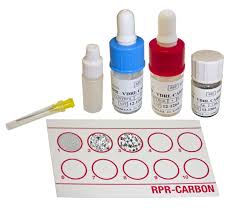Your RPR Test Results
Health screenings can bring relief, anxiety, or a sense of uncertainty—sometimes all at once. One widely used blood test, the Rapid Plasma Reagin (RPR), plays a key role in detecting syphilis, a sexually transmitted infection that can have serious consequences if left untreated. If your laboratory report reads RPR “non-reactive,” what does this result actually mean? Is it a cause for celebration, or does it call for further investigation? This thorough guide demystifies RPR testing and gives you the clear, comforting answers every patient deserves.

What Does a Non-Reactive RPR Test Result Mean?
The RPR (Rapid Plasma Reagin) test is designed to detect antibodies the body produces in response to Treponema pallidum, the bacterium responsible for syphilis. In simple terms, the test is looking for signs that your body has been exposed to this infection.
If your RPR result comes back “non-reactive,” here’s what that communicates:
- No antibodies were detected: The laboratory did not find the specific reagin antibodies the test is designed to measure.
- Interpretation: In most cases, a non-reactive result suggests you do not have a current syphilis infection.
- Clinical significance: For most healthy adults, especially those with no symptoms or recent risky exposures, this is a reassuring, normal finding.
However, context is everything in medicine. There are rare occasions where this result may not tell the full story.
Health Implications of a Non-Reactive RPR Result
Relief: No Evidence of Current Syphilis Infection
For the majority, a non-reactive RPR means no active syphilis and typically no need for further follow-up. Routine screenings—whether during pregnancy, STD checkups, or annual wellness visits—often yield non-reactive results, letting patients move forward with peace of mind.
When Further Investigation Is Needed
- Early Infection: RPR may not detect syphilis if you’ve been exposed very recently (before the body has produced antibodies).
- Late or Treated Infection: Very late-stage syphilis or those previously treated may occasionally yield non-reactive results despite past exposure.
- Immunosuppression: If your immune system is compromised, antibody production may be weaker, affecting test sensitivity.
Always share symptoms, recent exposures, and medical history with your provider—they help interpret results in context.
Causes and Clinical Meaning of False Negatives
Like all medical tests, the RPR is not perfect. Understanding the causes of false negatives can empower both doctors and patients to make smarter decisions.
Early Syphilis (Window Period)
- After exposure to syphilis, it can take up to 3-6 weeks for antibody levels to rise enough to be detected.
- Testing too soon—during this “window period”—may give a non-reactive result despite infection.
- Retesting after 2-4 weeks is standard practice if recent exposure is likely.
Late Syphilis or Past Treatment
- Years after an untreated infection, antibody levels may decline, yielding a non-reactive result even if late-stage symptoms or organ damage are present.
- Those successfully treated for syphilis may also show non-reactive RPR long-term.
Immunodeficiency
- Individuals on immunosuppressive therapy, or with medical conditions impairing immune responses (HIV/AIDS, chemotherapy), may not produce enough antibodies for detection.
Laboratory Error
- Rare, but possible; repeat testing or confirmatory assays clarify questionable results.
When Retesting or Additional Testing is Recommended
You Should Retest If:
- Recent high-risk sexual exposure (within 3 months)
- Development of symptoms strongly suggestive of syphilis: rash, sore, unexplained ulcers, visual changes, neurological complaints
- Contact tracing from a known syphilis-positive partner
- Pregnancy: Standard repeat screening during prenatal care
What About Confirmatory Tests?
Treponemal-specific tests (e.g., FTA-ABS, TPPA) may be ordered when:
- RPR is negative, but suspicion remains high
- History of syphilis infection
- Discrepant RPR results
Next Steps After a Non-Reactive RPR Result
For Asymptomatic Individuals with Low Risk
- No further action needed.
- Maintain regular sexual health checkups and safe practices.
For Recent Exposures or Symptoms
- Discuss the timing of exposure with your provider.
- Schedule retesting at appropriate intervals.
- Consider comprehensive STD screening if high-risk behaviors or multiple exposures are present.
For Those with Past Syphilis Treatment
- Document the history for future reference. Non-reactive results after successful treatment are typical.
Common Patient Questions & Reassuring Answers
Is a Non-Reactive RPR Always Accurate?
For most healthy adults with no recent risky contact, yes. But early-stage exposure or immunocompromise can rarely cause false negatives.
Should I Worry About Missing Syphilis?
If you have symptoms or risky contact, discuss the best timeline for testing with your doctor. Retesting often resolves uncertainty.
Can I Resume Intimate Contact?
If you have no symptoms and non-reactive results, you’re highly unlikely to transmit syphilis. Always maintain common-sense precautions and STD awareness.
What If I’m Pregnant?
Non-reactive RPR is reassuring. Standard prenatal care includes repeat testing later in pregnancy for ongoing protection.
Will Insurance Cover Repeat Testing?
Yes—especially if medically indicated due to exposure, symptoms, or prenatal care.
Interpreting Your Lab Report: Practical Takeaways
| Test Result | Meaning | Action Needed |
|---|---|---|
| Non-reactive | No antibodies; likely no syphilis | None if low risk; retest if exposure/symptoms |
| Weakly reactive | Possible very early infection | Confirm with treponemal test, repeat in 2-4 wks |
| Reactive | Antibodies detected | Confirmatory test, discuss treatment |
The Role of RPR in Broader Sexual Health
While focused on syphilis, RPR is just one part of comprehensive sexual health screening. Pairing RPR with tests for HIV, gonorrhea, chlamydia, and hepatitis B/C gives a richer, safer health picture.
Conclusion: Non-Reactive RPR—Knowledge for Peace of Mind
A non-reactive RPR test most often means your health and wellness are on firm footing—no signs of syphilis detected. For patients, the result is usually a moment to breathe easy, knowing that routine screening can work for prevention and long-term health. For those with risks, symptoms, or early exposure, smart retesting ensures you don’t miss early disease.
If ever in doubt—about timing, interpretation, or next steps—lean on your provider and established guidelines. Knowledge brings confidence, and vigilance protects not only you, but everyone you care about.